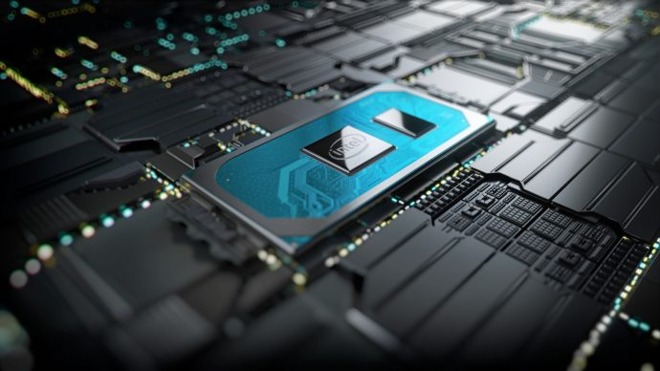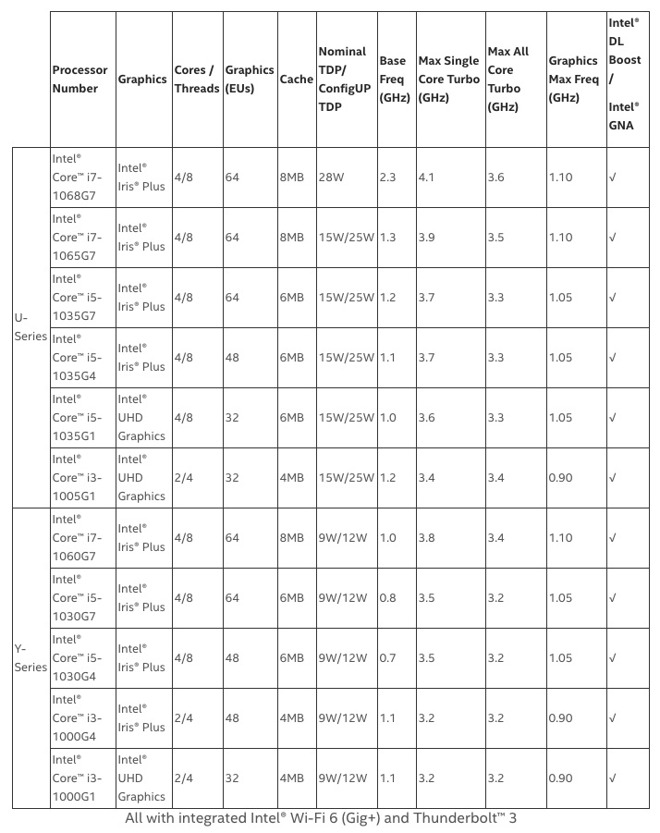Intel intros 'Ice Lake' 10th-generation Core processors, possibly for MacBook rebirth
Intel on Thursday unveiled its first batch of 10th-generation Core processors, dubbed "Ice Lake," offering a glimpse at the options Apple will have in future MacBooks.

The 10-nanometer laptop chips are designed for better board integration, and in fact include native support for technologies like Wi-Fi 6 and Thunderbolt 3. That should allow them to keep up with Apple's demands for growing performance in compact systems like the MacBook Air.
The initial batch includes 11 chips in total, split between U- and lower-end Y-series processors. At the bottom of the list is the Y-series Core i3 1000G1, a 1.1-gigahertz dual-core chip with UHD Graphics, a 4-megabyte cache, and Turbo speeds up to 3.2 gigahertz.
At the peak is the U-series Core i7-1068G7, a quad-core unit with an 8-megabyte cache and 2.3-gigahertz base speed, able to ramp up to 3.6 gigahertz across all cores. Single-core boosts can reach 4.1 gigahertz.

Intel's new incarnation of Iris Plus is said to offer "double the graphics performance," good enough for 1080p gaming and 4K video editing. The GPU is also Intel's first to support VESA Adaptive Sync, and purportedly the first integrated option anywhere with variable rate shading.
The company is switching to a new naming scheme as well, seen below.

Apple has already updated the MacBook Pro and MacBook Air this year, but is rumored to be preparing a 16-inch Pro for launch in October. That computer may effectively replace the 17-inch Pro, which was discontinued in 2012.

The 10-nanometer laptop chips are designed for better board integration, and in fact include native support for technologies like Wi-Fi 6 and Thunderbolt 3. That should allow them to keep up with Apple's demands for growing performance in compact systems like the MacBook Air.
The initial batch includes 11 chips in total, split between U- and lower-end Y-series processors. At the bottom of the list is the Y-series Core i3 1000G1, a 1.1-gigahertz dual-core chip with UHD Graphics, a 4-megabyte cache, and Turbo speeds up to 3.2 gigahertz.
At the peak is the U-series Core i7-1068G7, a quad-core unit with an 8-megabyte cache and 2.3-gigahertz base speed, able to ramp up to 3.6 gigahertz across all cores. Single-core boosts can reach 4.1 gigahertz.

Intel's new incarnation of Iris Plus is said to offer "double the graphics performance," good enough for 1080p gaming and 4K video editing. The GPU is also Intel's first to support VESA Adaptive Sync, and purportedly the first integrated option anywhere with variable rate shading.
The company is switching to a new naming scheme as well, seen below.

Apple has already updated the MacBook Pro and MacBook Air this year, but is rumored to be preparing a 16-inch Pro for launch in October. That computer may effectively replace the 17-inch Pro, which was discontinued in 2012.

Comments
It’s awkward for laptops, while AMD have no adequate mobile technologies, Intel is falling behind in core counts. You’re stuck either way. Thus, I think moving to ARM is the best hope for the Mac notebooks, skip the last x86 Macs, especially laptops, if you can.
Also, Intel is measuring TDP at their base frequencies, which means 9 Watts maximum for core m’s - at 1.0GHz, probably not including AVX.
Maybe Apples Intel patents will have us see a superior 5G+Wifi modem also.
The current MacBook Air uses an i5-8210Y rated at 7W nominal TDP.
The new 2TB3 13" MacBook Pro uses an i5-8257U or i7-8557U rated at 15W nominal TDP.
The 4TB3 13" MacBook Pro uses an i5-8279U or i7-8569U rated at 28W nominal TDP.
So the Y series Ice Lake would need slightly better cooling than the MacBook Air currently has, but not like twice as much cooling capacity.
The U-series Ice Lake should be drop-in replacements for the U-series in the MacBook Pro.
That’s okay, all of them will end up throttling like it’s the same chip.
If they can pull that off. Intel is really struggling to keep up with Apples demands in Macs. Bet you that. Intel are the bottleneck.
Would love to see Intels CEOs "Apple was not an important customer" speech after Apple drops them. lol
Look, no fan!
https://www.statista.com/statistics/263393/global-pc-shipments-since-1st-quarter-2009-by-vendor/
Apple is still a distant, distant 3rd in sales volume.
As for AMD and the Zen based processors I think you might be under the wrong impression. AMD for whatever reason does focus on the desktop / server market first probably because of traditional strengths there. However the Zen based laptop chips are actually a huge step forward and are more honestly specced for thermals. I’ve been running an AMD based laptop with Fedora as an operating system and actually have been rather impressed. Are far cheaper machine actually runs better than the 2017 13” MBP I had. It isn’t perfect but that has more to do with Linux than anything else.
So im not sure what the schedule is for Zen2 based laptop chips, maybe the end of the year? However I’d expect them to be the ideal choice for most laptop needs out side of the Apple niche. Considering the thermals and performance of current Zen 2 based hardware I see a good chance some very competitive laptops will arrive. That would be some place between a quarter and half year after Intel shipsin volume. Frankly in this day and age that delay is meaningless.